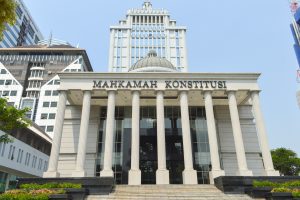Indonesia’s Constitutional Court yesterday upheld the minimum age requirement for presidential and vice presidential candidates, while carving out an exception for those who have held or been elected as regional leaders. The decision paves the way for the son of outgoing President Joko “Jokowi” Widodo to run for vice president at next year’s election – and again raises unease about the dominance of political dynasties in Indonesian politics.
The 6-to-2 court ruling upheld the current minimum age requirement of 40, but ruled that candidates under the required age could seek the presidency or vice presidency at next year’s election, providing they have previously held elected regional office.
This effectively granted a green light to Jokowi’s son Gibran Rakabuming Raka, who is currently 36 and serves as the mayor of Surakarta, to run as vice president in the 2024 election. While Gibran has not publicly expressed interest in running, political backers, particularly from Prabowo Subianto’s Gerindra Party, have been pushing for him to become Prabowo’s running-mate.
By creating a possible loophole for Gibran, the court’s decision raises fresh concerns about the outsized role played by political dynasties in a nation where democratic principles are still evolving. As Bivitri Susanti of Indonesia’s Jentera School of Law told Reuters, the ruling “has somewhat legalized dynastic politics in Indonesia.”
To be sure, in opening the door for younger candidates with political experience, the Constitutional Court’s decision offers an opportunity for fresh talent and diverse perspectives to enter the political landscape. But the possibility that this will allow power to be further concentrated among a select minority of politicians is unsettling.
Adding to the complexity is the recent entry of Jokowi’s second son into politics. Last month, Kaesang Pangarep was appointed the chairman of the youth-oriented Indonesian Solidarity Party, despite having no prior political experience. This development raises questions about the goals of the outgoing president as he nears the end of his second term. Is this an attempt to establish a family dynasty within Indonesian politics, or does it signify a deeper intention to shape the country’s political landscape for the better?
Indonesia has come a long way in its journey towards democracy since the fall of Suharto’s authoritarian regime in 1998. However, the political landscape continues to be dominated by established elites. The court’s rejection of the petition to lower the minimum age limit for presidential candidates to 35 acknowledged that experience matters and should not be overlooked in favor of youth. However, the loophole that it left open for younger elected regional leaders to run for the presidency has highlighted the tension between democratic principles and the consolidation of powerful family dynasties.
Concerns about political dynasties in Indonesia are well-founded. Since the fall of Suharto, the country’s politics has been dominated by a small number of powerful political families. History shows that the presence of political dynasties is accompanied by nepotism and unhealthy concentrations of power. In a diverse, populous nation like Indonesia, it’s essential to ensure political representation mirrors the nation’s demographics and interests rather than being dominated by a select few individuals or families.
The entrance of Jokowi’s sons into politics underscores this concern, raising doubts about the fairness of Indonesia’s democracy and the inclusivity of its political system for all citizens. It also raises questions about the competence and readiness of such individuals, potentially compromising democratic principles of meritocracy and governance quality in Indonesia.
As Jokowi approaches the end of his second term, questions arise about his family’s growing role in politics. Is he aiming to build a lasting political dynasty, or does he sincerely believe his family members are the most qualified? This uncertainty demands clarity in order to uphold the public’s trust and confidence in Indonesia’s democratic system.
The potential for political dynasties to take root in Indonesia also underscores the importance of political party reform. Strong, transparent, and accountable political parties are essential to maintaining a healthy democracy. When parties are driven by ideology and meritocracy rather than personal connections and nepotism, the risk of dynastic rule diminishes.
In the Indonesian context, party reform is vital in light of the emergence of new political figures, particularly Jokowi’s family members, who lack the political experience and ideological grounding typically associated with established political parties. This lack of experience, combined with the potential for unchecked influence, can undermine the democratic process and the credibility of the political system.
As Indonesia grapples with the complexities of political succession and the threat of dynastic rule, it is essential to strike a balance between democracy, meritocracy, and the need to prevent the concentration of power by a select few. It is a reminder that political parties, institutions, and electoral processes must be reformed and strengthened to ensure that the democratic system remains responsive, transparent, and truly representative of the people’s interests.

































